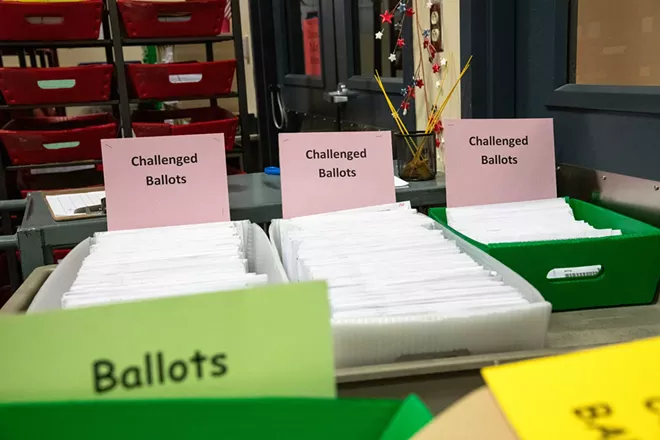An election season shadowed in concern about drop-box vigilantes and unfounded claims of voter fraud ended in a way that was... pretty uneventful. The projected winners mostly won, turnout was consistent, and the red wave didn't really happen.
Still, this year's results did hold a few surprises. Here are five big numbers that stood out.
Unfounded claims of widespread election fraud — spurred by former President Donald Trump — continue to haunt local elections offices. Earlier this month, volunteers from both parties observed a three-hour, state-required audit of the county's vote-counting machines that found no issues.
Voter fraud does occasionally happen, but not in great enough numbers to sway elections. An Associated Press analysis found that the six battleground states that flipped the 2020 election for Joe Biden had fewer than 475 cases of potential voter fraud during that election. Out of 25 million votes.
About 225,000 ballots were cast in Spokane County this year. Of those, three are being investigated for potential fraud. The ballots all came from the same household, and had an "X" written on the line where voters are supposed to put their signature.
That was enough to raise the suspicion of the county canvassing board, who determined that the signatures were not legitimate and referred them to the prosecuting attorney's office to follow up and investigate for potential fraud. Spokane County Auditor Vicky Dalton has worked as county auditor since 1998 and says she can't remember ever seeing something like this before.
In Spokane, 2,443 ballots — 1.09 percent of the total — were challenged this election.
More than half of those ballots were challenged because election officials think the signature on the ballot didn't match the one on file. People can "cure" their ballots by filling out a form fixing the signature issue, but many don't.
The signature verification system is designed to protect against fraud, but advocates argue that many of the rejected ballots aren't fraudulent — people are just inconsistent in how they write their signature. Many voters don't know how to fix signature issues or simply don't have time. Last week, three nonprofit groups filed a lawsuit in King County seeking to ban signature rejections and deem them unconstitutional.
The other big reason ballots get challenged is because they're late. This year, 735 Spokane ballots were challenged because they were turned in after the 8 pm deadline on Nov. 8. There's no way to cure those.
McMorris Rodgers has a tight grip on Washington's 5th Congressional District. Progressives have been trying, and failing, to unseat her for years, including this year, when Natasha Hill got just 40 percent of voters to back her.
But despite running a reelection campaign that few people expected to be competitive, McMorris Rodgers was raking in the cash this election cycle. According to the Committee for Responsible Politics, which tracks spending in political races, McMorris Rodgers received almost $3 million from corporate PACs this year — that's more than any of the other 800 candidates who ran for the House across the country this year. Much of the money McMorris Rodgers raised came from big companies like Amazon, Microsoft, Blackstone, Koch, Sinclair, Target, SpaceX and Pfizer. The closest runner-up, Rep. Rodney Davis, R-Ill., received just over $2 million in contributions from PACS.
Now that Republicans control the House, McMorris Rodgers, who is entering her 10th term, is expected to lead the Energy and Commerce Committee, which oversees a range of industries. Giants of the oil and gas industry — Chevron, Marathon Petroleum, Valero Energy, Southwest Gas and Edison Electric Institute — all gave money to McMorris Rodgers.
To trigger an automatic machine recount in Washington, candidates have to be separated by fewer than 2,000 votes and a 0.5 percentage gap. While the margin between Bob McCaslin, a departing Republican state representative, and Dalton, a Democrat, is less than 2,000, the percentage gap is 0.55 — just high enough to avoid an automatic recount.
McCaslin, who can still request a ballot recount that he'd have to pay for, has previously alluded to election conspiracies in campaign materials. In 2021 he co-sponsored legislation calling for an audit of the 2020 election.
After it was clear Dalton had won, McCaslin sent out an email saying he was still waiting for the final results, asked why cameras weren't running in the auditor's office and said Dalton's role overseeing elections "raises suspicions in the minds of voters regarding the integrity of the election."
Dalton says she voluntarily steps back from managing elections anytime she is on the ballot. As soon as she files to run for office, the election manager disables her badge so she can't open doors to the rooms where ballots are being counted. As for the cameras, Dalton notes that the cameras were actually turned on before Election Day, and that people can file records requests for the footage.
The race to replace departing Sheriff Ozzie Knezovich featured two Republicans: John Nowels and Wade Nelson. Nowels, a current undersheriff who had Knezovich's endorsement, won handily with 57 percent of the vote compared with Nelson's 40 percent.
But a large number of voters — almost 15 percent of those who returned ballots — didn't vote for either candidate.
The sheriff's race had 28,565 undervotes, which means the voter left both bubbles on their ballot empty for that race. There were also 4,119 voters who wrote in someone else's name, and another 24 voters bubbled in both options, which is not allowed.
Paul Dillon, a progressive activist and vice president of public affairs for Planned Parenthood of Greater Washington and North Idaho, says the two choices for sheriff this year left many progressive voters feeling cold. Dillon thinks many voters on the left had mixed feelings about supporting Nowels, Knezovich's chosen replacement. Though Nelson wasn't exactly an Ozzie 2.0, Dillon notes that Nelson's policy positions weren't favorable to progressive ideals either.
While none of the other contested races this year attracted nearly as many undervotes and write-ins, it's also worth noting that the sheriff's race was the only county-wide race with two Republicans. ♦































